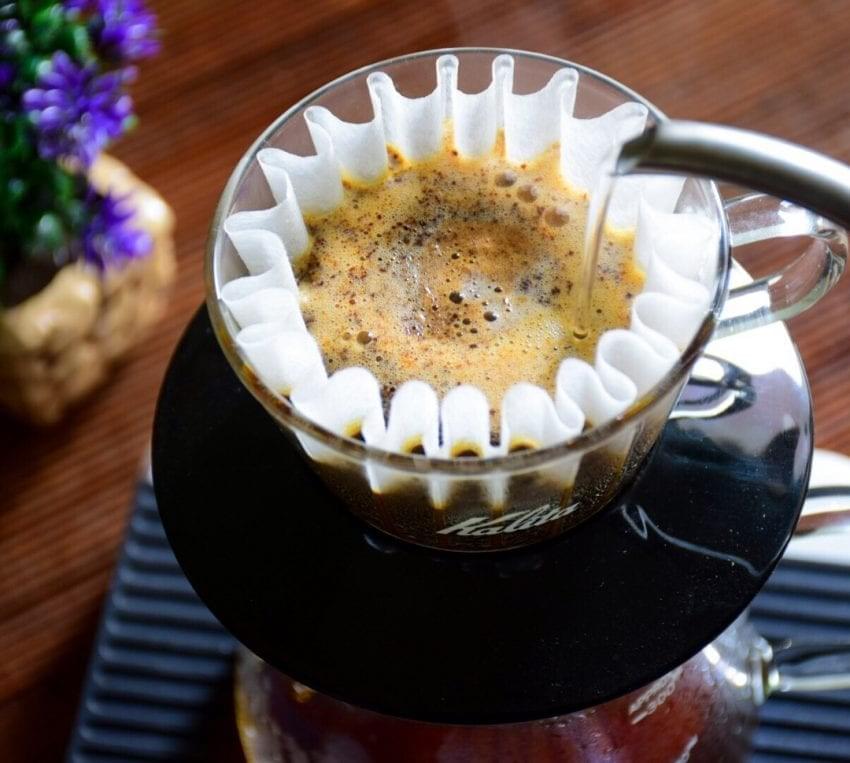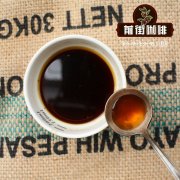Rushing out may not necessarily get a drink: how to understand the relationship between extraction and flavor experience?
Professional coffee knowledge exchange more coffee bean information please follow the coffee workshop (Wechat official account cafe_style)
Previously, in the article "key factors affecting coffee brewing: temperature", I left a title for everyone: "after brewing coffee is still too sour, what if we can only adjust the brewing time and temperature?"
Many people have responded and understand the truth of "cooling down if you want to be sour and heating up if you want to suffer". However, some people have provided some exceptions, saying that some special varieties or baked beans, on the contrary, when the temperature is raised, the acidity becomes thicker, even a little difficult to accept, but there is no sweet and bitter taste.
Of course, only a few beans are like this, and most beans still taste bitter at high temperature or even higher than scorched taste, and taste sour at low temperature.

In fact, no matter whether the cooking time or temperature is good, the main effect is the extraction rate. When the temperature increases, both the acidity and bitterness will increase synchronously, and the overall extraction rate will also increase. So how to explain the difference between the pros and cons of these two phenomena, that is, why some beans are hotter and bitterer, while others are hotter and sour?
One: the corresponding relationship between flavor and temperature.
In some coffee beans, there are all kinds of strange flavor substances, which correspond to different dissolution temperatures, and it takes a certain degree of water temperature to cause a unique aroma or flavor, such as cold-extracted coffee and hot-extracted coffee, even if the extraction rate is the same. The flavor experience is also different. Of course, the taste may be sour or bitter. It is only said that because of the variety or baking environment, the probability of high temperature bringing out bitterness is higher, and the probability of bringing out acid is relatively low.
To put it simply, it is a bit like a key. If you insert it at a certain temperature, some beans will click; if you turn on the acid, some beans will click and turn on the bitter taste.
For any variety of coffee beans, the sour and bitter flavor molecules increase synchronously with the increase of temperature. The higher the temperature, the more bitter some beans are, because of their shallow baking, strong sour taste and less bitter taste, no more than 100 ℃ water temperature, so the acid extract is heavier than the bitter taste. Some beans do not taste bitter simply because the water temperature you raise is not high enough.
Second: the relationship between flavor and taste balance.
Although the extraction rate of all flavor molecules increases with the increase of temperature, our tongues still feel sour or bitter, which is a problem of taste balance.
You will think that the acid is because the acid obviously covers the bitter taste, you will feel that the bitter taste is obviously because the bitter taste covers the acid, and you think it is sweet because the acid and bitterness just neutralize and weaken, but highlight the sweetness. But in fact, the acidity and bitterness of this cup of coffee have not disappeared, and there are no extreme cases of only acidity or bitterness.
People's tongue and nose are two fools who are easy to deceive, and their sense of taste and smell can easily be affected and concealed. There are three possibilities that you can't feel a smell: one is that it is too small for you to notice, one is that it is masked by other smells, and the last is that you are so used to it that you subconsciously ignore it.
Third, the relationship between flavor and extraction rate.
In daily life, the concept of "over-extraction" is often used, but this concept poses a great hindrance to beginners.
You said extract, will the most extreme mixing method be too exquisite? The powder is fine, the water temperature is high, and the water is stirred. Most people will feel that it has been extracted to the horizon at a glance, but is it good? Other people's god Matt Perger used it to win the championship of the World Cooking Competition.
For example, what about Japanese ice hand flushing with high concentration and low extraction rate? Are we going to say that it is not extractable enough? But the coffee made by ice hands is also delicious.
So the concept of "over-extraction" should mean that the bean you are brewing by hand is the best in a reasonable range under a certain cooking parameter, more than called extraction, not enough extraction.
However, there are hundreds of ways to treat coffee beans in the world, and there are different roasting methods, so this "reasonable range" appears to be so general that it is impossible to generalize and impractical. Some beans have a high extraction rate, but they will not taste bad, while some beans will not taste bad even if the extraction rate is very low. In some beans, the extraction rate and concentration will obviously hit the "golden cup extraction", but they are still not good to taste. To say so is to say nothing. )
Does the extraction rate have anything to do with the flavor and the taste of the coffee? Of course there is. However, between the extraction rate and flavor, "temperature", "uniformity" and other restrictions should be added, so it is difficult to determine the coffin in one shot.
Generally speaking, most of the beans that you think are problematic and untasty are the problem of taste imbalance.
For example, when a bean is bought, it is found that the baker seems to have baked it. A little bitter, or the bean texture is ordinary, the bean baker wants to bake a little deeper to grind off the astringent taste.
At this time, the strategy you can try is to reduce its powder-to-water ratio and extraction rate, but raise the temperature to see if there is a way to hide the bitterness of the roasted aroma, so as to make people think that although the coffee is bitter, it is still full of fragrance. At least the coffee taste is still strong after adding sugar and milk.
For example, shallow baking is very popular in the market now, and it rushes out of Kenya's super acid, which is extremely sour, but the sweet smell is not very good.
Then the suggestion may be to raise the temperature of the water to see if there is a bitter taste to balance the acidity, and further make it very light, so that it will not be difficult to taste. After all. Honey lemon juice may be loved by many people, but eating lemon should be done by very few people.
In short, the focus of coffee extraction is "how to achieve a personal taste balance", rather than reflected in a certain extraction rate or extraction method. What tastes good or not, what you like and what you don't like will be found in the coffee. There is no concept of "want it or not" or "have it". It's just a question of "can you drink it?" To put it bluntly, how to deceive the human tongue.
END
Important Notice :
前街咖啡 FrontStreet Coffee has moved to new addredd:
FrontStreet Coffee Address: 315,Donghua East Road,GuangZhou
Tel:020 38364473
- Prev

Do you know the difference between "fragrant acid" and "dead acid"? How to distinguish all kinds of caffeic acid?
Professional coffee knowledge exchange more coffee bean information Please follow the coffee workshop (Wechat official account cafe_style) [the difference between aroma and dead acid] many people in the coffee industry say that "high-quality coffee has a sour taste" and that sour taste is a delicacy. However, we often hear many people say: I do not like to drink sour coffee, and then with a good sour expression actually
- Next

Understand Arabica Coffee how to make Arabica Coffee Culture
Professional coffee knowledge exchange more coffee bean information please follow the coffee workshop (Wechat official account cafe_style) Arabian coffee history: the origin of coffee legend came from the shepherds of Ethiopia, and then spread to the Arab countries, but according to historical data about the eighth century AD the leaves of the Arabian Peninsula and Ethiopia across the Red Sea have a record of trade, and at this time there are also records of trade in Yemen.
Related
- How did the Salvadoran coffee industry develop in Central America?
- What exactly does the golden cup extraction of coffee mean?
- The Origin of Coffee flower
- [2023 Starbucks World Earth Day] there are more meaningful things besides free Starbucks coffee!
- What kind of coffee is there in Spain? 9 Flavors of Spanish Coffee
- Aromatic African coffee| Kenya's coffee culture and historical production area
- Liberica Coffee Bean knowledge: the characteristics of Liberian Coffee beans of the three original species of Coffee beans
- The origin and formula of Spanish latte introduces the taste characteristics of Bombon coffee in Valencia, Spain.
- How to adjust the solution of over-extracted coffee
- What is the tasting period of coffee beans? What is the period of coffee and beans? How should coffee wake up and raise beans?

